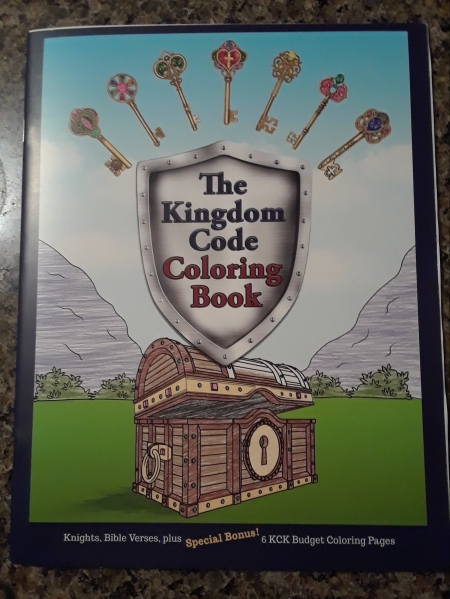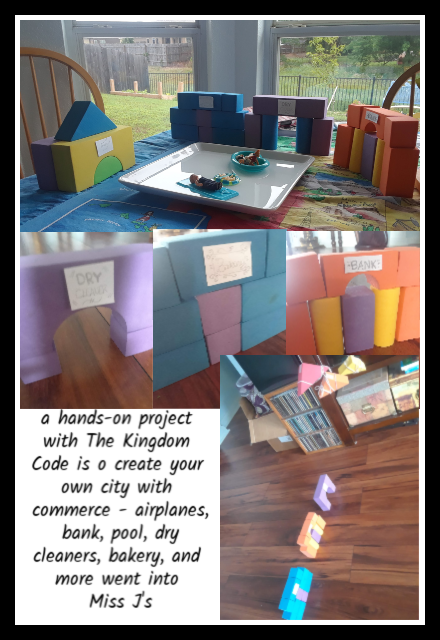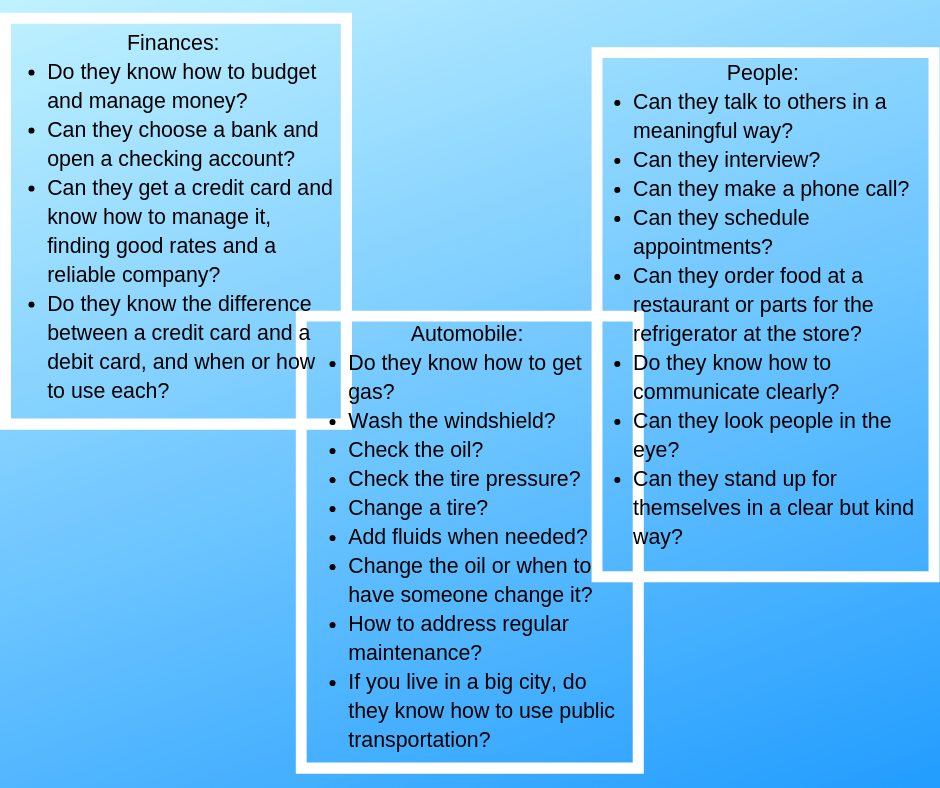
Financial education is something that should not be neglected yet is often not considered as important as other subjects. At the Teach Them Diligently convention held in Waco, TX, we stumbled across a little gem of a company – The Kingdom Code. They offer a course in financial education through the formation of a business run fully by the students and working on personal and business budgeting in the process. Their The Complete Starter Kit looked so wonderful. We were unable to purchase it that weekend but definitely had it in our sights for later this year, hoping to find a place to have it fit in our fall schedule.

When we got home and I opened up my Homeschool Review Crew email, I found that The Kingdom Code was the next vendor we were being asked to take a look at. Now that is not a coincidence! We were very excited, especially my 15 year old daughter who had two business ideas in her head that she wanted to figure out what to do with. We were thrilled to be chosen to be on this review.
The Kingdom Code is a company that was designed to help educate students at a young age about budgeting, spending wisely, managing money, and running a business. What a great idea! Geared towards grades 3-6, it can easily be adapted to work for older students. If you are looking to make it a high school credit, you may decide you need to add an additional budgeting book to it but there is a lot of meat to this program all by itself.
All three of the girls decided that they wanted to work through the program after it arrived and we were happy to accommodate that as we understand the importance of learning to handle money wisely. And the earlier, the better. We received
There are free lesson samples available on The Kingdom Code website.
 The textbook came as part of The Complete Starter Kit. This 240-page, spiral bound text has 27 lessons that are recommended to be taught no faster than one lesson a week, through two sessions. There are a number of features that I find to be a huge asset. Each lesson has a different character focus, such as seeking wisdom, having courage, showing honor, or being thrifty. This is a code of honor that Kingdom Code Kids are encouraged to follow and is put into a Biblical context, with a focus on trusting in God to guide and provide. There are Bible verses in each lesson to help students frame the information in a Godly manner. There are studies of people who have created businesses and done well with them, highlighting that success but not ignoring the failures and struggles along the way. There are letters from “Aunt Jimmi” which helps students see the idea that is being talked about in the lesson and putting real life experiences to it. There are discussions, worksheets, additional research, and so much more!
The textbook came as part of The Complete Starter Kit. This 240-page, spiral bound text has 27 lessons that are recommended to be taught no faster than one lesson a week, through two sessions. There are a number of features that I find to be a huge asset. Each lesson has a different character focus, such as seeking wisdom, having courage, showing honor, or being thrifty. This is a code of honor that Kingdom Code Kids are encouraged to follow and is put into a Biblical context, with a focus on trusting in God to guide and provide. There are Bible verses in each lesson to help students frame the information in a Godly manner. There are studies of people who have created businesses and done well with them, highlighting that success but not ignoring the failures and struggles along the way. There are letters from “Aunt Jimmi” which helps students see the idea that is being talked about in the lesson and putting real life experiences to it. There are discussions, worksheets, additional research, and so much more!

Each lesson follows approximately the same set-up. Starting with a proclamation, the students begin their worksheets, have a quest for the clue (often historical in content and leading to the character focus of the week), learning the code of honor, applying that to their business or life, marking the treasure map and then going through some On Your Own activities. There are a few other parts of lessons that will come in but these are the main ones.
 Following the On Your Own activities is a recap of the Kingdom Keys for the lesson and then some additional Bonus Code Work. These are activities to help the student internalize the ideas even more. Some of these are hands-on and some are more abstract. For example, you might write a jingle to remember the JOEYS letters for budgets, write a letter of encouragement, take a trip to the bank, make a flipchart or have a discussion. Each lesson also includes vocabulary words that are important to financial matters and the Code of Honor, including words like financial, entrepreneurs, taxes, pride, and perseverance.
Following the On Your Own activities is a recap of the Kingdom Keys for the lesson and then some additional Bonus Code Work. These are activities to help the student internalize the ideas even more. Some of these are hands-on and some are more abstract. For example, you might write a jingle to remember the JOEYS letters for budgets, write a letter of encouragement, take a trip to the bank, make a flipchart or have a discussion. Each lesson also includes vocabulary words that are important to financial matters and the Code of Honor, including words like financial, entrepreneurs, taxes, pride, and perseverance.
 The Teacher’s Guide is a black and white set of 132 pages, hole punched and ready to go in a teaching binder. After the listing of what all is included and A Note to the Teacher, there is an Introduction that gets you started with step-by-step instructions. This walks you through the purpose of each part of the lesson and each of the additional materials that go with the program. (These additional materials are found in the Student Packet.) It is a bit intensive up front to set it all up and get familiar with the program.
The Teacher’s Guide is a black and white set of 132 pages, hole punched and ready to go in a teaching binder. After the listing of what all is included and A Note to the Teacher, there is an Introduction that gets you started with step-by-step instructions. This walks you through the purpose of each part of the lesson and each of the additional materials that go with the program. (These additional materials are found in the Student Packet.) It is a bit intensive up front to set it all up and get familiar with the program.


Next in the Teacher’s Guide you get the lesson plans. These are extensive lesson plans and are set up for two sessions per lesson for most lessons. This gives you a full year’s worth of financial curriculum. Each lesson gives you the objective, learning goals, and essential questions, a list of materials, any suggestions or reminders, and the two days worth of lessons. There are specific instructional materials for each part of the lesson and each activity for the lesson. It is very thorough. You also have the answers to the worksheets and suggested enrichment. At the end, there are some assessments and feedback cards, with a few other blank forms that may be needed.

The Student Packet is intended for use by one student as the materials are consumable. This is where you find the worksheets to go with each lesson. There is a map for tracking progress by using stickers. There is a set of stickers to use with setting up the budgeting part of the program. There are flashcards to help students learn and remember the vocabulary for each lesson, noted with the lesson number. This is where the “rubber meets the road” so to speak – these forms, notices, worksheets, and vocabulary become the part that is carried with the student throughout their lifetime. The instructions for setting it all up are found in the Teacher’s Guide.
There are several forms and notices available on the website for those who have purchased the curriculum and are customers of The Kingdom Code. These include calendars, ledgers, income statements, and more.

The JR Budget Kit is a small package that includes a budget poster, a sticker set, six coloring pages, budgeting percentages page, and instructions on using the budget kit. It is a simple way to begin budgeting and helping students learn to allocate money. It uses the same budgeting allocation as the business kit, only does not include putting money into the business. It is appropriate for very young students with guidance from parents.


The Kingdom Code Coloring Book is a 32-page book of coloring pages for students that may be too young for participating in the business part of the program but are listening to the lessons. They can color pictures of bible verses, knights, treasure boxes, budgeting shields, and more. It could be very good in combination with the JR Budget Kit for younger students, though some of the pages are the same.
All of this comes together to be a practical application of financial literacy. We started really strong with the program and everyone is pleased with it. It is not difficult to teach, nor is it difficult for older students to work through on their own, though they will need guidance along the way. We have spent two days per lesson so far and feel that it is a fairly comfortable pace during full school days. Days can include reading text, discussion, brainstorming, or completing worksheets, among other activities We slowed down when it came time to really figure out what business was going to be pursued to get that solidly in place.

The focus of The Kingdom Code for the first business is a service based business. This is a great idea for younger students but it was a difficult thought for the older girls when they already had ideas for goods based businesses. But, after we took an extra couple of days to think about what service based might look like (not everything has to be mowing lawns or cleaning houses), some good ideas were come up with. Miss E realized that she was actually already do a service-based business – sign language interpretation.

Miss E signing to a player at a baseball game.
She took this idea and will be working further with it. It was quite a realization to discover that, without the formal recognition and paperwork, you are already working as a volunteer business. She is planning on teaching her younger sister sign language this coming year and that will be where she takes this program next – applying the business building materials to her job as sign language interpreter and instructor. We had planned to have someone teach Miss J anyhow, so Miss E will be earning pay for this service.
We are pleased with the program and plan to pause with it for the remainder of the summer as the girls’ camps, missions, and conventions are starting. But, come fall, this will be on the curriculum list for high school, middle school, and elementary. I plan to have Miss E read a book on personal finance that we really like, as well as write a paper or keep track of budget for a few months, in order to grant her a high school credit.

Miss E looking at the Student Packet.
I am going to close this out by letting Miss E have your ear/eye for a bit to give you her review of the program.
Miss E’s review:
I really liked this curriculum. I think that our whole family wanted to do the goods based business first rather than the service based, but I enjoyed the first few lessons just the same.
Something that I would change would be the worksheets for preparing your service business. I don’t see any reason to come up with 5 different businesses, then narrow it to 3 without even doing anything with them, and then working out the barest minimum of a plan for all 3. I personally had minor problems with the service based because our family’s schedule during the school year is full of commitments and on top of that, a number of my commitments were service jobs that I did not charge for.
I do understand that the curriculum was not designed for a high school freshman like me, but I think that it would work with a little bit of tweaking. The material was a little bit easy for me, except for figuring out a service based business. I would enjoy seeing a higher level KCK curriculum.
One thing that I really enjoyed about this is that it brought God into everything. Again, it was not talking about God on my level of comprehension, but a younger level. To be honest, I never really thought about what to do with the money once you had earned it. Obviously, you spend some for the business, give some to God, and save some, but I never thought about how much goes where.
I really want to learn about managing money and a business because I might want to own a business someday. Or I might sell bracelets or something. And even if I don’t, it is still a really good thing to know.
As you can see, this appeals on many levels and is guidance that is much needed in our society. One of the things I was blessed with growing up is strong financial stewardship examples. At Home Dad and I have talked often about the best way to pass Godly financial stewardship on to our girls. The Kingdom Code is helping in that goal.
I also have a code for you to use when ordering to receive 10% off of your order on The Kingdom Code webside. I do not know for how long this code will be good so don’t hesitate in using it. This is a worthwhile curriculum.
Coupon Code: 10TKC33
Blessings
Lori, At Home.
Be sure to click on the banner below to visit the Homeschool Review Crew to see what other families thought about The Kingdom Code
program.


Share At Home: where life happens



























 The textbook came as part of The Complete Starter Kit. This 240-page, spiral bound text has 27 lessons that are recommended to be taught no faster than one lesson a week, through two sessions. There are a number of features that I find to be a huge asset. Each lesson has a different character focus, such as seeking wisdom, having courage, showing honor, or being thrifty. This is a code of honor that Kingdom Code Kids are encouraged to follow and is put into a Biblical context, with a focus on trusting in God to guide and provide. There are Bible verses in each lesson to help students frame the information in a Godly manner. There are studies of people who have created businesses and done well with them, highlighting that success but not ignoring the failures and struggles along the way. There are letters from “Aunt Jimmi” which helps students see the idea that is being talked about in the lesson and putting real life experiences to it. There are discussions, worksheets, additional research, and so much more!
The textbook came as part of The Complete Starter Kit. This 240-page, spiral bound text has 27 lessons that are recommended to be taught no faster than one lesson a week, through two sessions. There are a number of features that I find to be a huge asset. Each lesson has a different character focus, such as seeking wisdom, having courage, showing honor, or being thrifty. This is a code of honor that Kingdom Code Kids are encouraged to follow and is put into a Biblical context, with a focus on trusting in God to guide and provide. There are Bible verses in each lesson to help students frame the information in a Godly manner. There are studies of people who have created businesses and done well with them, highlighting that success but not ignoring the failures and struggles along the way. There are letters from “Aunt Jimmi” which helps students see the idea that is being talked about in the lesson and putting real life experiences to it. There are discussions, worksheets, additional research, and so much more!
 Following the On Your Own activities is a recap of the Kingdom Keys for the lesson and then some additional Bonus Code Work. These are activities to help the student internalize the ideas even more. Some of these are hands-on and some are more abstract. For example, you might write a jingle to remember the JOEYS letters for budgets, write a letter of encouragement, take a trip to the bank, make a flipchart or have a discussion. Each lesson also includes vocabulary words that are important to financial matters and the Code of Honor, including words like financial, entrepreneurs, taxes, pride, and perseverance.
Following the On Your Own activities is a recap of the Kingdom Keys for the lesson and then some additional Bonus Code Work. These are activities to help the student internalize the ideas even more. Some of these are hands-on and some are more abstract. For example, you might write a jingle to remember the JOEYS letters for budgets, write a letter of encouragement, take a trip to the bank, make a flipchart or have a discussion. Each lesson also includes vocabulary words that are important to financial matters and the Code of Honor, including words like financial, entrepreneurs, taxes, pride, and perseverance. The Teacher’s Guide is a black and white set of 132 pages, hole punched and ready to go in a teaching binder. After the listing of what all is included and A Note to the Teacher, there is an Introduction that gets you started with step-by-step instructions. This walks you through the purpose of each part of the lesson and each of the additional materials that go with the program. (These additional materials are found in the Student Packet.) It is a bit intensive up front to set it all up and get familiar with the program.
The Teacher’s Guide is a black and white set of 132 pages, hole punched and ready to go in a teaching binder. After the listing of what all is included and A Note to the Teacher, there is an Introduction that gets you started with step-by-step instructions. This walks you through the purpose of each part of the lesson and each of the additional materials that go with the program. (These additional materials are found in the Student Packet.) It is a bit intensive up front to set it all up and get familiar with the program.



















